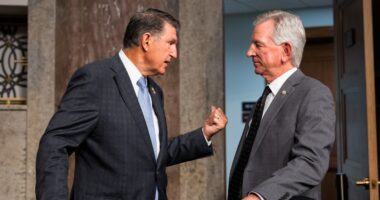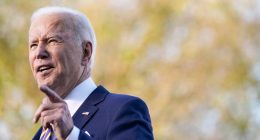
A new executive order by President Trump attempts to clear up questions about what American investors must do to divest securities of a growing list of companies that the U.S. says help the Chinese military.
The order is the latest in a series of attempts by the Trump administration to clarify fuzzy rules related to a Nov. 12 directive barring investments in companies designated by the U.S. as “Communist Chinese military companies.”
The new order, issued Wednesday, explains that investors are prohibited from the sale of publicly traded securities related to designated companies after a government-scheduled wind-down period. It also makes explicit that American investors can’t hold securities of these blacklisted entities after the wind-down period is over.
Initially, the order prohibited only the purchase of securities related to the entities on the blacklist. The original order also wasn’t explicit about whether investors could still hold securities after the window for transactions had closed, lawyers said.
“It clears up a significant uncertainty,” said Eric Lorber, a managing director at compliance consulting firm K2 Integrity. “But there’s a whole bucket of uncertainty still out there.”
Compliance officers at large banks, pension funds and hedge funds are still struggling to figure out whether related companies—not just those on the list—are affected by the order, a situation that at times has become more confounding by government efforts to clarify the directive, sanctions lawyers say.
Mr. Trump’s November order barred investments in 31 Chinese companies that are said to support China’s military, intelligence and security services. Americans were to stop investing in those companies starting Monday. They have until November to unload existing investments in companies on the list, which is maintained by the Pentagon. The list has grown to include 44 entities, including nine added Thursday by the Department of Defense. The list could still grow.
Such prohibitions are typically accompanied by details spelling out the specific legal names of entities—parent companies, affiliates, subsidiaries—affected by the action. But some names on the list issued by U.S. authorities following Mr. Trump’s November directive didn’t match the names of issuers of publicly traded securities, spurring confusion over which entities were affected by the action, lawyers said.
Ambiguity concerning the blacklist was at the root of recent reversals by the New York Stock Exchange over a decision to delist American depositary receipts in China’s three big telecommunications operators, The Wall Street Journal previously reported.
Investors have also been wrestling with questions about whether the prohibition extends to transactions involving subsidiaries of blacklisted companies. Companies that are owned 50% or more by a blocked entity are typically also blocked under rules set by the U.S. Treasury Department’s Office of Foreign Assets Control, or OFAC. It wasn’t initially clear whether that rule applied, lawyers said.
“Where everyone is struggling is in defining which entities are those specifically subject to the restrictions,” said Cari Stinebower, a partner specializing in economic sanctions at law firm Winston & Strawn LLP in Washington.
OFAC, which is in charge of enforcing the order, attempted to clarify those points in a series of memos since the November directive was issued. But its updated guidance has at times prompted more questions.
OFAC issued a more detailed list of entities in recent weeks, which has helped straighten out which companies are specifically targeted by the order. But a separate OFAC memo on Dec. 28 said the order would also apply to subsidiaries if they have a name that “closely matches” a blacklisted entity. OFAC, however, didn’t define what it meant by “closely matches,” which baffled compliance officers who are accustomed to a higher level of specificity, lawyers said.
“They just don’t have any sense for how wide the scope of ‘closely matches’ goes,” said Mr. Lorber, a former senior adviser to the Treasury’s undersecretary for terrorism and financial intelligence.
A Treasury spokesman declined to comment.
OFAC has since extended to Jan. 28 the deadline for companies to stop investing in subsidiaries with closely matching names, giving them more time to figure out which investments are affected by the new guidance.
Lacking more specifics from OFAC, firms likely would have to run four main compliance checks: one for companies on the U.S. list, another for sister companies whose names closely match a listed entity, a third for subsidiaries that are 50% or more owned and are also named by OFAC, and a fourth for qualifying subsidiaries that aren’t listed by OFAC but have similar names, lawyers said.
That will require some interpretation by compliance officers, who are likely to compare notes with peers at other companies, said Ms. Stinebower, who previously served as counsel at OFAC. “It’s this situation where the entire world is trying to comply,” she said, “but nobody knows what’s going on.”
Write to Jack Hagel at [email protected]
Copyright ©2020 Dow Jones & Company, Inc. All Rights Reserved. 87990cbe856818d5eddac44c7b1cdeb8
This post first appeared on wsj.com








